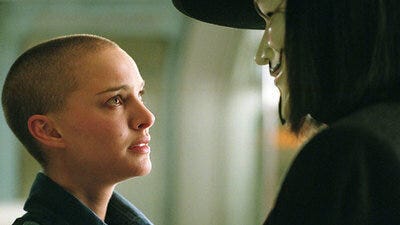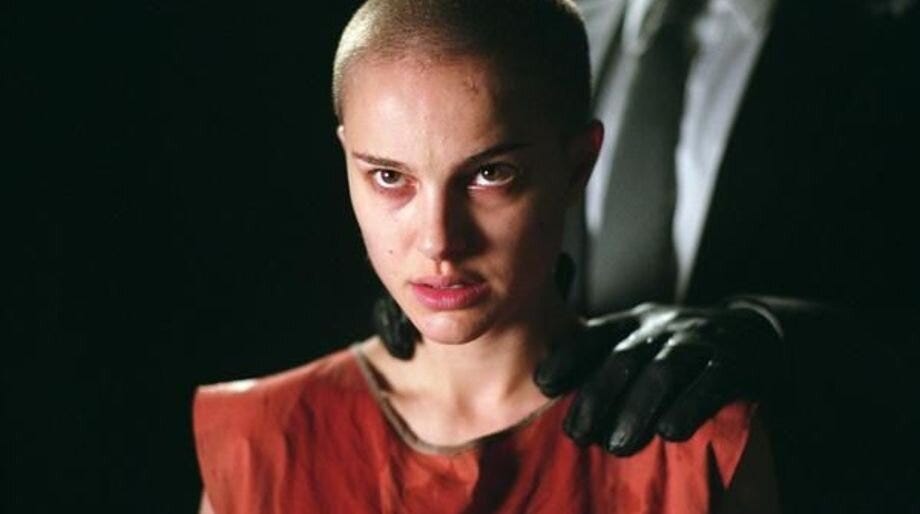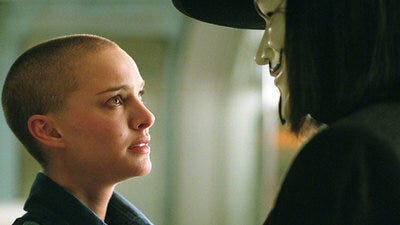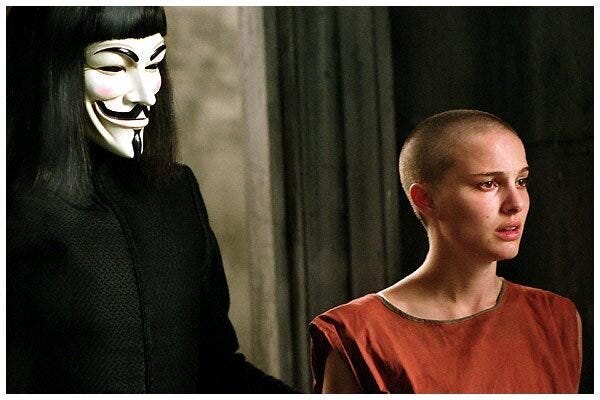V also stands for Vigilance, the kind of dogged resistance we need to ensure that fearand political rhetoric don't undermine the human rights that people have fought for and earned in the past century. This is a film whose themes are firmly rooted in the now, despite it actually being set in the not-too-distant future. It asks us, how do we define a terrorist? Who defines what a terrorist is? Who is pulling our strings as a thinking and moral society, and why do we let them do it?
If you had read widely on this film and still had no idea that it even contained lesbian content, I wouldn't blame you. For a film whose middle section is all about gay and lesbian persecution, the queer storylines have been all but erased in the reviews and critiques from the straight press. Everyone who has seen the previous work of Larry and Andy Wachowski (as was when this film was released) knows what a commitment they have as filmmakers to the LGBT community, even if you missed the fact that The Matrix Trilogy was a huge transgender allegory. What’s interesting is the gay content is not in the original graphic novel, it was added because the writers thought it was important.
The story centres on Evey (Natalie Portman), a girl with a horrific past. Evey is out after curfew in this futuristic, militant society and is set upon and almost raped by government officers. She's saved by the mysterious V (Hugo Weaving), a lunatic in a Guy Fawkes mask and cape, whose introductory monologue uses more V words than I actually knew there were in the dictionary, and who manages to both charm and repulse the naturally curious Evey.
She follows him to a desolate rooftop where he promises to show her something spectacular, and she watches in horror as he proceeds to blow up the Old Bailey. This is just the first in a series of actions V intends to take. It is also a huge turning point in Evey's life. She's caught on security camera and linked with the vigilante, and her life as she knows it is over. Pursued by a persistent detective (Stephan Rea) and haunted by her own growing feelings for V, she's no longer able to hide behind her normal life and normal fears.
What does all this have to do with gay people? It's hard to explain without spoiling a vital part of the story, which could possibly explain why most critics aren't touching on it in their reviews. Let's just say that at first Evey is a little reluctant to give up her way of life and commit to the cause. It is through the stories and courage of one gay man and one lesbian couple who make a stand, as well as remembering the sacrifices made by her own parents, that Evey begins to understand the possible role she could and should play in making things right again.
Like NAZI Germany (and the allusions linking fascism with the rise of modern "policing" are unflinching), the government in this England of the year 2020 is rounding up all so-called "dissidents". While we see many different victims of the regime suffer, the film lingers on the stories of what is suffered by gays and lesbians. The fantasy setting takes much of the edge off it, but one scene in particular of a mass grave is as in-your-face as it gets.
I was moved to tears. My straight friends thought I was mad. They couldn't understand why I was so touched. In fact, one even remarked that she thought the storyline involving the two women went on for too long and dragged down the pace of the movie. Well, maybe they're right. Maybe sticking the lesbian love story in the middle of an action movie does somewhat halt the narrative flow. But it isn't too difficult to imagine yourself right there, being "bagged" by the totalitarian government and dragged away, never to be seen again.
You start to question yourself. What would I do if this happened? If a government came to power that started stripping away my rights and freedoms, how would I fight back? The thing is, in the real 2020 in the era of Trumpism, we don’t even need to imagine it.
What drives the protagonists isn't just freedom and rights and lofty ideals, it's love. There's lots of talk about how you can kill a man, but you can't kill an idea. There's also the flip side about how ideas might be immortal, but that you can't talk to an idea, you can't hug an idea. That takes a flesh and blood person. What V for Vendetta also drives home, better than any film has in a long time, is that those flesh and blood people who love and have courage and ideas worth preserving are gay as well as straight.
So, in the midst of all this blow-em-up action and intrigue I found myself feeling represented. The knowledge that in the world of this film my rights as a human being were also being fought for by the mysterious and enigmatic hero heightened the enjoyment factor tenfold. I could get caught up in it with no personal reservations, no nagging outsider feelings in the back of my mind.
After all that, because V is behind a mask, it's easy to imagine him as anything you want him to be. Far from making him disembodied and difficult to relate to (as some reviewers have suggested), the mask actually helped me to avoid imposing a unique identity on him. He is himself, yet he represents us all. Within the V for Vendetta world, only Evey understands this. She loves both the man and the idea, his two distinct halves, with equal passion.
The plot of V for Vendetta occurs over exactly one year. One year to turn a world around. What if in one year we could take the voices of the all the people who give a crap and make some significant change. I'm not talking about blowing up a building. I'm talking about solidifying rather than eroding the rights of the LGBT community all over the world. Imagine that.






